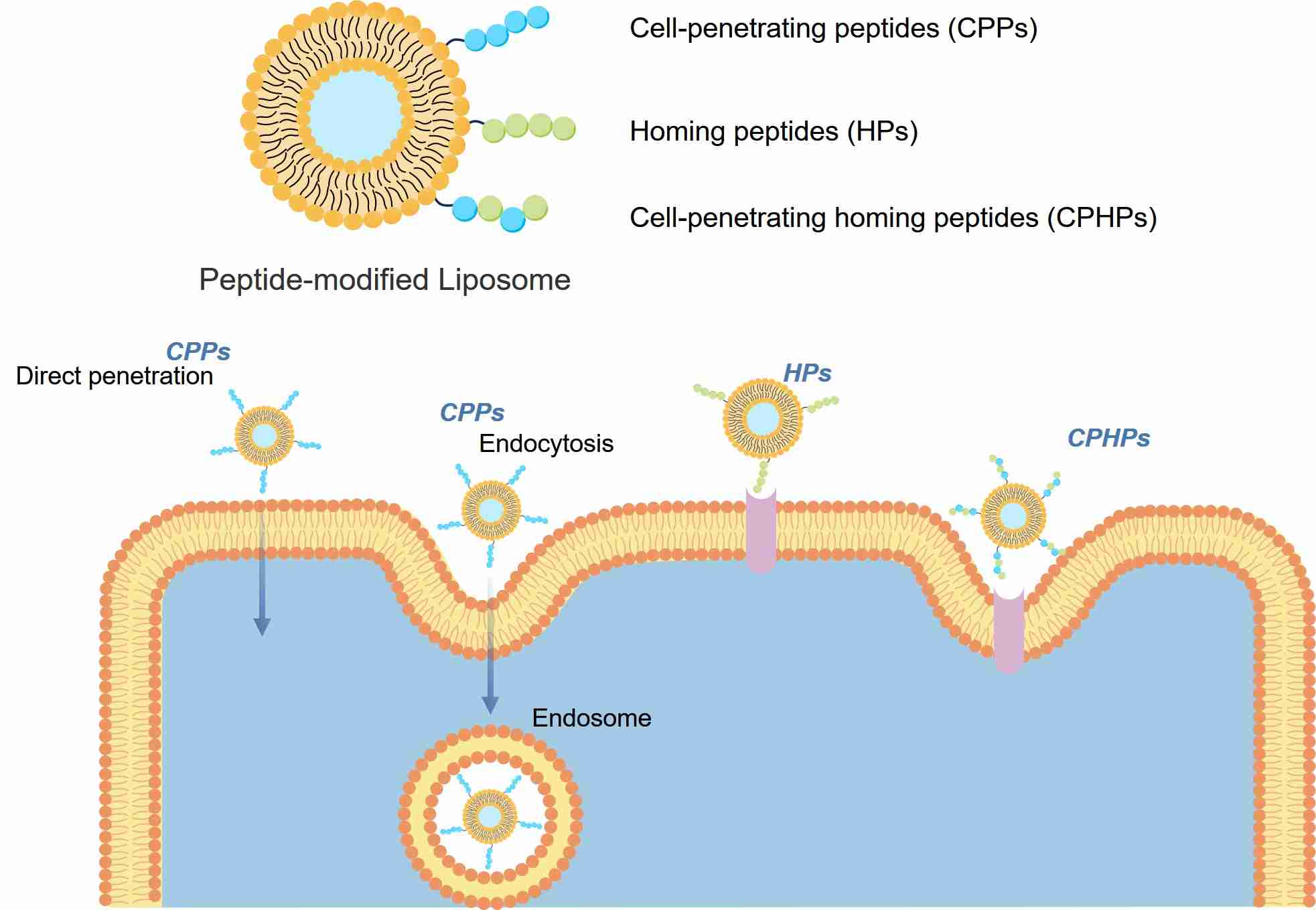Peptide-modified Liposome Development Service
Conventional liposomes may be passively targeted via the enhanced permeability and retention (EPR) effect, whereas active targeting can be performed by altering the properties and surface chemistry of liposomes. Peptide molecules are key bioactive substances that engage in the organism's growth, development, and metabolism, as well as being an intermediate product of protein hydrolysis. They offer several benefits, including high specificity and selectivity, small size, simplicity of modification, and excellent biocompatibility. Peptides can bind to receptor proteins on the surface or within cells. Therefore, surface modification of liposomes with peptides can guide liposome targeting to specific cells and enhance cellular uptake.
Types of Peptides Available for Liposome Surface Modification
 Fig.1 Schematic representation of the mechanism of peptide-modified liposome.
Fig.1 Schematic representation of the mechanism of peptide-modified liposome.
The peptides can be classified into cell-penetrating peptides (CPPs), tumor-homing peptides (HPs), and cell-penetrating homing peptides (CPHPs) based on their functions.
CPPs are a class of small-sized peptides with short amino acid sequences, exhibiting high affinity with lipid bilayers. When CPP binds to the cell membrane, these peptide sequences are responsible for membrane translocation, facilitating the internalization of CPP into the cell.
HPs, also known as targeting peptides, are a class of specific peptides that bind to tumor cells or tumor microenvironment factors. RGD is the most typical HP that specifically binds to integrin receptors (αvβ3, αvβ5, and αvβ1), allowing the interaction of RGD-liposomes with the extracellular matrix and cell membranes.
CPHPs possess both cell-targeting and cell-penetrating functions.
Creative Biolabs possesses a large peptide library and cutting-edge technology that allows us to customize peptide-modified liposomes to meet your unique requirements for more precise drug delivery and therapeutic efficacy.
|
Category
|
Peptide
|
Efficacy
|
|
CPP
|
TAT peptide
|
Enhanced cellular internalization of liposomes.
|
|
Penetration peptide
|
|
Rabies virus-derived peptide
|
|
Chimeric rabies virus glycoprotein fragment
|
|
PTDHIV-1 peptide
|
|
HP
|
RGD peptides (linear RGD, cyclic RGD)
|
Promoting the binding of liposomes to integrin receptors.
|
|
NGR peptide
|
Promoting the binding of liposomes to aminopeptidase N (CD13), which is expressed in tumor cells.
|
|
ZS-1 peptide
|
Promoting the binding of liposomes to human non-small cell lung carcinoma cell.
|
|
PCM peptide
|
Promoting the specific binding of liposomes to cardiomyocytes.
|
|
VPA peptide
|
Promoting the binding of liposomes to somatostatin receptors (SSTRs), which is overexpressed in tumor cells.
|
|
PR_b peptide
|
Promoting the binding of liposomes to α5β1, which is overexpressed in tumor cells.
|
|
Angiopep-2 peptide
|
Promoting the binding of liposomes to LRP-1 receptors that are expressed in the blood-brain barrier and tumor cells.
|
|
Lyp-1 peptide
|
Promoting the binding of liposomes to the neuropilin receptor, which is expressed in tumor cells.
|
|
GE11 peptide
|
Promoting the specific binding of liposomes to EGFR.
|
|
CPHPs
|
iRGD peptide
|
Promoting the binding of liposomes to αvβ3 that is overexpressed on tumor cells and promoting the intracellular uptake of liposomes.
|
Why Choose Us?
-
Cost-effective solutions
-
Reliable after-sales service
-
A variety of peptide options are available
-
Standardized research and production processes
Creative Biolabs offers a professional team and advanced technology to customize peptide-modified liposomes that are suited to your specific requirements. Please contact us for more information on peptide-modified liposome development to help speed up your drug development process.

For Research Use Only. Not For Clinical Use

 Fig.1 Schematic representation of the mechanism of peptide-modified liposome.
Fig.1 Schematic representation of the mechanism of peptide-modified liposome.
 For Research Use Only. Not For Clinical Use
For Research Use Only. Not For Clinical Use


